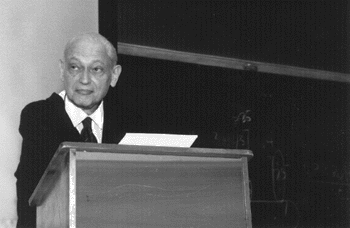|
|
"Goldmanfest" Celebrates Career of Math Sciences ProfessorBy Greg RienziThe Gazette |

Ladies and gentlemen. Come one, come all and marvel at the daredevil of digits, the swami of subtraction, that most nimble of numerists, Hopkins alum Arthur Benjamin, the mathematical magician.Although Arthur Benjamin received an introduction not quite like that at his most recent performance, there was a hint of carnival atmosphere in the air at Homewood's Maryland Hall on April 30.
Benjamin, a full-time math professor at Harvey Mudd College and part-time human calculator, had come to Hopkins not only to wow the gathered guests with such mathematical feats as rapidly squaring five-digit numbers in his head but also to pay tribute to his former professor, Alan J. Goldman, on the eve of his retirement from full-time status.

|
| Alan Goldman, above, and below right surrounded by, clockwise: Ingrid Busch, Motakuri Ramana, Arthur Benjamin, Colin Wynne, Jeffrey Grell, Alan Kosansky, Yaw Chang, Steven Steinsaltz and Alan Robinson. Below left: James Fill and other Goldman colleagues enjoy the day. |
Benjamin's performance, titled "Mathemagic: The Art of Mental Calculation," was part of the six-hour Goldmanfest that celebrated the career of the highly respected professor in the Mathematical Sciences Department of the Whiting School of Engineering. The well-attended event also featured diverse lectures by four of Goldman's prominent former doctoral students and touching reminiscences by a number of colleagues and former students.
During the proceedings, Goldman also was honored with several gifts, among them the surprise announcement of the introduction of an annual lecture series that will bear his name.
Goldman, an expert in operations research, has been a faculty member since 1979. His special interests include facility siting, transportation analysis and the overall use of mathematics to improve management decisions and system designs. Goldman has worked with the United States Post Office in locating facilities, and his involvement with the U.S. Department of Defense and the Federal Aviation Administration has led to maximizing the range of aircraft using air-to-air refueling and determining the capacity of airplane runway configurations.
The Brooklyn native holds several awards including the U.S. Department of Commerce Gold Medal and election to the highly prestigious National Academy of Engineering.
Prior to coming to Hopkins, Goldman worked at the National Bureau of Standards (now known as the National Institute of Standards and Technology), where he was founder and chief of operations research and deputy chief of applied mathematics.
Goldman has since thrust himself wholeheartedly into the world of academia. James Fill, a professor of mathematical sciences who helped organize the Goldmanfest, says teaching and Hopkins have been a very significant portion of Goldman's life for the past 20 years.
"If you were to say to some people, you can't be a professor anymore, their reaction could range anywhere from mild annoyance to total devastation," Fill said. "I think Alan would be a lot closer to the total devastation end of that one."
Goldman, an eloquent speaker and lecturer, is famous for what has come to be known as "The Goldman Question," a penetrating question he asks a speaker at the end of a seminar or lecture that is so finely crafted that it sounds as if it were prepared in advance.
Goldman recalls how in becoming a professor he looked forward to sharing his many years of mathematical application experience. However, during his speech at the conclusion of Goldmanfest, he said that over the years he also has learned quite a deal from his students.
"It really goes both ways. If by the time one of my students finishes a thesis he or she doesn't know more about that topic than I do, then I would have failed," Goldman said.
Goldman's teaching career was interrupted briefly in 1989 by a near fatal automobile accident, which occurred on Charles Street near the Homewood campus. Told then he'd be permanently disabled, Goldman made a miraculous and rapid recovery and was able to return to teaching just a year later.
Goldman said he thought the event might alter his outlook on life in some very profound way but found that once he was back in harness he returned to his old "workaholic" habits.
"Life just sort of closed in again," Goldman added.
He is still dedicated to his work and views this next phase of his life as period of only partial retirement. Goldman will continue on as professor emeritus and will teach two courses a year in addition to advising doctoral students and working on a number of Mathematical Sciences committees. He also plans to continue his work on a series of research projects.
When asked why he chose math as his vocation, Goldman said it might have been due in large part to his own perceived shyness as a youth.
"Math is a field where you can pull into yourself and do your own thing and maybe, if you are good at it, you can develop some self-confidence," Goldman said. "Now you feel you know something and you can go out and face the world in a bolder way. I think math did that for me; some other subjects might not have."
His students would say he chose wisely.
| GO TO MAY 10, 1999 TABLE OF CONTENTS. |
| GO TO THE GAZETTE HOMEPAGE. |

